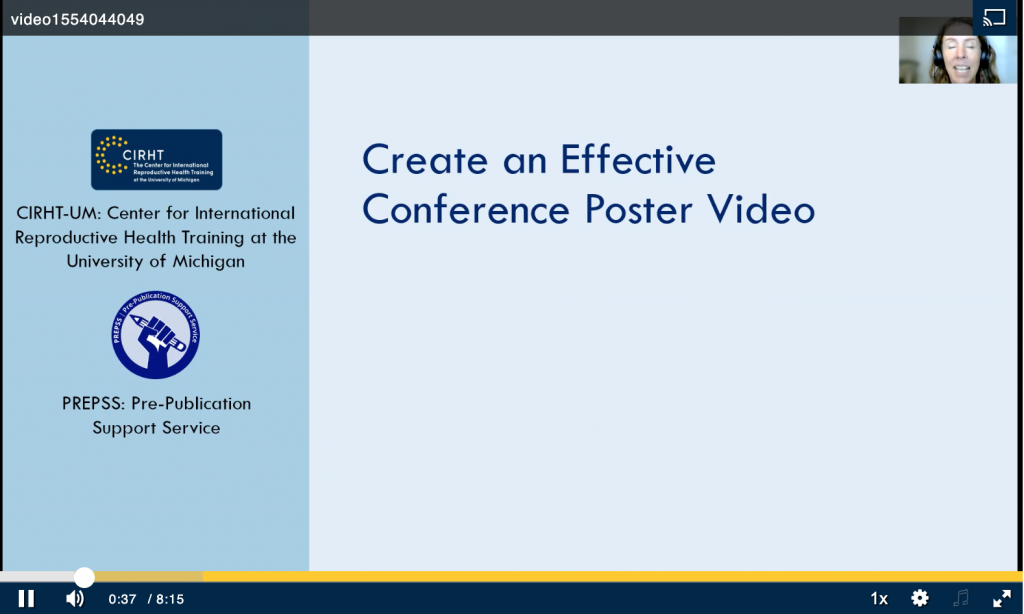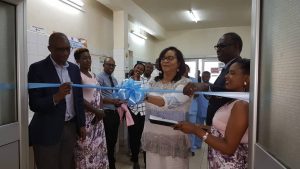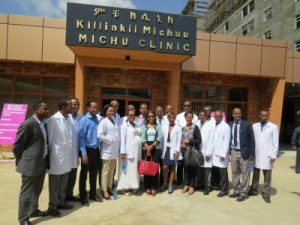News Review – 2 June 2017
Getting rid of the stigma and discrimination that surrounds menstruation in many places, ending the difficulties girls and women around the world encounter, and encouraging education, more communication, and access to supplies, were all part of the global discussion on international Menstrual Hygiene Day, May 28. Beyond basic education, ending the cycle of isolating girls and women and forcing them to miss school and work opportunities requires work across many fronts. In the UK, charities and companies are encouraging women to donate sanitary products to women who cannot afford them. Plan International calls for a ‘period emoji’ to address the taboo and researchers can benefit from a “menstrual cycle on a chip”. The serious consequences of the issue are brought home in a horrifying story from Uganda about “young women having sex with older men for sanitary pads.”
Sexual education is an essential element of saving adolescent lives and reducing maternal mortality, and is the past week saw vigorous promotion from UNESCO, the governments Ghana and Nigeria, and calls from youth groups in DRC and Liberia. One article suggests that Sex education fails Kenya’s pupils. An academic study shows that long-acting reversible contraceptives (LARC) are most appropriate for adolescents, but that clinicians need to improve their communication and education to promote a larger uptake. Yet one outlier study cited by Family First actually states that “less sex ed has best outcomes.”
Dr. Tedros Adhanom Ghebreyesus, the newly-elected director-general of the WHO, got more free advice from around the world. Securing the organization’s funding seemed to be the first focus. Among the many other priorities working towards universal health care, “diversify engagement with countries” and “make global health about care, not fear.”
Consequences of the US administration’s policies remain a concern – the gag rule’s “human cost” in Kenya, the threat to women’s health globally by the export of political reproductive health policies, and with the withdrawal from the Paris climate accord, IPPF re-released an article about the convergence of consequences of reproductive rights and climate change.
Finally, a good read from The Atlantic about The Doctor Who Revolutionized Hospital-Birth Safety, about Dr. Steve Clark who followed scientific evidence, “applied his own common sense’, created protocols and insists that “consistency helps mothers and babies.”
Complete News Review References:
General
U.S. Export of Political Reproductive Health Policies Threatens Women’s Health Globally, Women’s E-news, 1 June 2017
Breastfeeding linked to lower endometrial cancer risk, Reuters, 1 Jun 2017
Menstrual Cycle “on a Chip” Offers a New Window into Female Physiology, Scientific American, June 2017
A better sexual and reproductive health education could save adolescent lives, UNESCO, 31 May 2017
Less Sex Ed Actually Has Best Outcomes – UK Study, Scoop/Family First, 31 May 2017
IPPF honours outstanding contributions to sexual and reproductive health and rights, IPPF, 30 May 2017
Charity calls for ‘period emoji’ to address taboo of menstruation, Thomson Reuters Foundation, 30 May 2017
Teen birth rate hits historic low in U.S., CBS News, 30 May 2017
Five Easy Strategies To Reduce Back Pain During Pregnancy, Pregistry, 30 May 2017
“The Most Important Endangered Species?” Humans., Global Health Now, 29 May 2017
Breaking the silence on menstrual health and stemming the flood, Thomson Reuters Foundation, 28 May 2017
Artificial Wombs: How They Could Save Lives but Kill Abortion Rights, Harvard Political Review, 28 May 2017
Menstrual Hygiene Day, WASH United, 28 May 2017
Tampons that care: helping girls across the world to end ‘shame of periods’, The Guardian, 27 May 2017
The Doctor Who Revolutionized Hospital-Birth Safety, The Atlantic, 26 May 2017
Changing the Law to Undermine Reproductive Rights and Women’s Health, American Constitution Society, 25 May 2017
Why a monthly period is especially hard for millions of women and girls around the world, The Conversation, 25 May 2017
Obstetric fistula; a silent death for millions of women and girls, Thomson Reuters Foundation, 23 May 2017
Normal birth – a moral and ethical imperative, Sheena Byrom, 23 May 2017
ICYMI: Gender, Sexual and Reproductive Health and Rights, and Climate Change: What are the links?, IPPF, 27 Jun 2016
WHO
The tough job facing Tedros, WHO’s first African head, SciDevNet, 2 Jun 2017
Dr Tedros can make history by tackling global health funding, Graduate Institute Geneva, 1 June 2017
New WHO director-general makes major commitment to nursing, Nursing Standard, 31 May 2017
8 takeaways from the 70th World Health Assembly, Devex, 31 May 2017
The making of a WHO director general, BMJ, 31 May 2017
Why new WHO boss is fit for post, The Citizen (Tanzania), 31 May 2017
Ilona Kickbusch: The new director general of WHO and the politics of global health, BMJ, 31 May 2017
Advice for Tedros: Laurie Garrett Q&A, Part II, Global Health Now, 31 May 2017
Electing WHO’s New DG: Laurie Garrett Q&A, Part I, Global Health Now, 30 May 2017
Three ideas on how the new WHO DG can build health systems from the bottom up, The Conversation, 26 May 2017
Opinion: How new Director-General Tedros must modernize WHO’s engagement with the world, Devex, 26 May 2017
Ethiopia’s Tedros Faces Challenges as New WHO Chief, VOA, 26 May 2017
New WHO DG: An African success story in leadership and accountability, Nigeria Health Watch, 24 May 2017
Challenges and priorities for WHO’s new director general Tedros, Reuters, 23 May 2017
Academic
Mortality among twins and singletons in sub-Saharan Africa between 1995 and 2014: a pooled analysis of data from 90 Demographic and Health Surveys in 30 countries, The Lancet Global Health, 31 May 2017
Long-Acting Reversible Contraception for Adolescents – A Review, JAMA, 30 May 2017
Maternal age and severe maternal morbidity: A population-based retrospective cohort study, PLOS Medicine, 30 May 2017
Predictors of vaginal delivery in medically indicated early preterm induction of labor, AJOG, 9 May 2017
Racial/ethnic differences in contraceptive preferences, beliefs, and self-efficacy among women veterans, AJOG, May 2017
Benin
La situation de la planification familiale au Bénin, Partenariat de Ouagadougou, 31 May 2017
Botswana
In Botswana, Simple Meetings Drastically Improve Cervical Cancer Care, 25 May 2017
DRC
Family Planning and the “Voice of Youth” in Democratic Republic of Congo , JHCCP, 30 May 2017
Ethiopia
No more FGM! The Uncut Girls’ Club in Ethiopia, Plan International, 24 May 2017
Ghana
Sexuality education materials launched for the youth, Graphic Online, 2 Jun 2017
NGO holds forum on reproductive health, Ghana News Agency, 1 Jun 2017
First Lady rallies support for referral hospital, Ghana News Agency, 29 May 2017
Talk to children about reproductive health, Ghana News Agency, 29 May 2017
Social justice institutions trained on SGBV, Ghana News Agency, 29 May 2017
Kenya
DKT makes entry into Kenyan reproductive health market, Capital Business, 2 June 2017
Sex education fails Kenya’s pupils, Mail & Guardian (SA), 2 June 2017
Advancing respectful maternity care in Kenya: a comprehensive approach, Population Council, 25 May 2017
The Human Cost of the Global Gag Rule: A Kenyan Story, IWHC, 24 May 2017
Ensuring safer pregnancies for Kenyan women in urban slums, The Conversation, 22 May 2017
We Are Kenya’s Future: Young People and Our Nation’s Growth, PRB, May 2017
Liberia
Young people call for education, health care, rights – and politicians are listening, UNFPA, 19 May 2017
Malawi
Malawi govt releases Abortion Bill to the public, Nyasa Times, 27 May 2017
Nigeria
Fistula: The holes afflicting women is treatable, Daily Trust, 2 Jun 2017
School girls learn menstrual hygiene, management, Daily Trust, 1 Jun 2017
Ogun govt. vows to promote family planning programmes, World Stage, 31 May 2017
NGO Trains 200 School Girls On Reproductive Health, Entrepreneurship, Leadership, 31 May 2017
Maternal Mortality: Group urges FG to introduce sex education in schools, Nigerian Tribune, 27 May 2017
Edo First Lady Partners Women Doctors, PM News, 26 May 2017
Safe Motherhood :NGO seeks more investment in family planning services, Business Day, 26 May 2017
Sierra Leone
President Koroma calls for collective effort to reverse maternal death trend, Concord Times, 1 Jun 2017
Better health services for women, babies and young people in Sierra Leone; Achievements and Lessons Learned by IRMNH Programme, My Sierra Leone, 29 May 2017
Tanzania
Ten youth-led groups unite to promote reproductive health in TZ, The Citizen, 31 May 2017
MHD: Plea for ‘every schoolgirl a pad’, Daily News, 30 May 2017
Girl rights activists challenge MPs on pregnancy policy, The Citizen, 29 May 2017
UNESCO to launch campaign against FGM, The Citizen, 29 May 2017
Femina wants girls to talk about menstruation, The Citizen, 29 May 2017
Hope for FGM victims as surgery reverses side effects, Daily News, 28 May 2017
Uganda
Tackling taboos about abortion, IPPF, 1 Jun 2017
These stories could have been different, IPPF, 1 Jun 2017
Lango starts battle against teenage pregnancy, Daily Monitor, 31 May 2017
Seeing poor pregnant women suffer opened my eyes, Daily Monitor, 30 May 2017
Uganda has only 25 fistula doctors, Daily Monitor, 30 May 2017
Young girls having sex with older men for sanitary pads, Daily Monitor, 30 May 2017
Zambia
Facing the challenge of high fertility, Daily Mail, 31 May 2017





